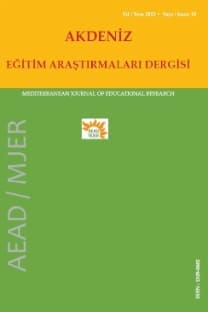Kuzey Kıbrıs'ta çevre eğitimi ihtiyaçları ve eğilimleri
Çevre, insanoğlunu da içeren canlı varlıkları destekleyen tüm koşulların toplamıdır. Çevre, doğal ve insan yapımı sistemlerden meydana gelmektedir. Doğal çevrenin durumu eninde sonunda dünyadaki yaşam kalitesini ve yaşamın devamını belirlemektedir. Çevre eğitimi, insanoğlunun çevre üzerindeki olumsuz etkilerinin keşfedilmesi sonucu ortaya çıkmıştır. Bu nedenle, çevre eğitimi çevreyi koruma ve neticede dünyadaki yaşamın devamı için son derece önemlidir. Kıbrıs'taki çevre eğitiminin mevcut durumu her iki toplumda da farklıdır. 1974 hadiselerinden önce, müfredat iki zaman aralığına ayrılmıştır: İngiliz İdaresi (1896-1959) ve Bağımsızlık dönemi (1960-1974). 199O'lı yıllarda, Kıbrıs Rum Toplumunda vatandaşları 21. yüzyıla hazırlamak maksadıyla, çevre eğitimi tabirinin yerini 'sürdürülebilir kalkınma için eğitim' aşamalı olarak almıştır. Diğer taraftan, Kuzey Kıbrıs'ta çevre eğitimi özellikle trafik üzerinde odaklanmış "çevre ve trafik" ile öğretilmekteydi. Bugünlerde, çevre problemleri üzerinde artan baskı ile birlikte, Eğitim Bakanlığı ders kitaplarını değiştirmekte ve çevre hakkındaki yeni bölümlerler ders kitaplarına eklenmektedir. Bu çalışmanın amacı, Kıbrıs'taki ilkokullarda çevre eğitimi ile ilgili neler yaşandığı ile ilgili bir enstantane sağlamak ve bir çevre eğitimi müfredatının geliştirilmesine yardımcı olmaktır. Öğrencileri bilgi ve kabiliyetle donatmanın en iyi yolu, çevre eğitimini okullarda öğretilen tüm konularla bütünleştirmekten geçmektedir. Eğitim müfredatı bağlamında, öğrenciler çevrelerini sevmelerine ve korumalarına yönelik olarak, doğanın bir mucize ve neşe kaynağı olduğu ile bağlantılı olarak eğitilmelidirler. Daha iyi bir eğitim için, öncelikle, çevre eğitimini müfredatla bütünleştirmek maksadıyla öneriler geliştirmekle ilgili çalışacak komitelerin kurulması gerekmektedir. Bu suretle, problem çözme kabiliyetlerini geliştirmeyi özendirmek amacıyla müfredatın, küresel ve bölgesel çevre, politik, ekonomik, sosyal ve kültürel konularda kritik düşünmeyi teşvik etmesi gerekmektedir.
Needs and trends of environmental education in Northern Cyprus
Environment is the aggregate of all the conditions that support living things including human beings. The environment consists of both natural and human-made systems and the state of the natural environment ultimately determines the quality and survival of life on the Earth. The birth of environmental education is due to the discovery of the negative effects of human beings on the environment. For this reason, environmental education is extremely important when it comes to protecting environment and consequently survival of life on Earth. The current status of environmental education in Cyprus is different in both Communities. Before the 1974 incidents, the curriculum can be divided into two time intervals as: English Rule (1896-1959) and Independence period (1960-1974). In 1990s, the term environmental education was gradually replaced by education for sustainable development in Greek Cypriot Community as a tool for preparing citizens for the 21st century. On the other hartd, in Northern Cyprus environmental education had been taught as "environment and traffic" which was especially focused on traffic. Nowadays, with the increasing pressure of the environmental problems, The Ministry of Education has been replacing textbooks and new units on environment have been added to textbooks. The purpose of this study is to provide a snapshot of what is going in Northern Cyprus primary schools with regards to environmental education and help to develop an environmental education curriculum. To equip students with knowledge and abilities, the best way is to do so is to integrate environmental education into every subject taught in schools. In the context of education curriculum, students should be taught to love and protect their environment by relating them to nature as a source of wonder and joy. For a better education, first of all, it is necessary to establish committees that will work on the development of proposals for integrating environmental education into the curriculum. Thus, the curriculum should foster critical thinking of global and regional environmental, political, economic, social and cultural issues in an attempt to encourage the development of problem solving abilities.
___
- CALDERIA, K., JAIN, A. K. ve HOFFERT, M. I., 2003. Climate Sensitivity Uncertainty and the Need for Energy without CO2 Emission. Science 299 (5615): 2052-2054.
- GOA, C, HOU, H., ZHANG, J., ZHANG, H. ve GONG, W., 2006. Education for Regional Sustainable Development: Experiences from the Education Framework of HHCEPZ Project. Journal of Cleaner Production, 14 (2006) 944-1002.
- IUCN, 1970. International Working Meeting on Environmental Education in the School Curriculum, Final Report, Gland. Switzerland.
- MAPPIN, M. ve JOHNSON. E., 2005. Changing Perspectives of Ecology and Education in Environmental Education. İçinde: Johnson, E. ve Mappin, M. (editörler) Environmental Education and Advocacy: Changing Perspectives of Ecology and Education. Cambridge University Press, s. 1-28.
- NSWDET, 2001. Environmental Education Policy for Schools. NSW Department of Education and Training, DET Sales, PO Box, 218, Bankstown NSW 2200, ISBN 0 7313 7019 8, s. 23.
- STOKES, E., EDGE A. ve WEST, A., 2001. Synthesis Report: Environmental Education in the Educational Systems of the European Union. Centre for Educational Research, London School of Economics and Political Science, s. 31.
- ISSN: 1309-0682
- Yayın Aralığı: Yılda 4 Sayı
- Başlangıç: 2008
- Yayıncı: Tayfun Taşbilek
